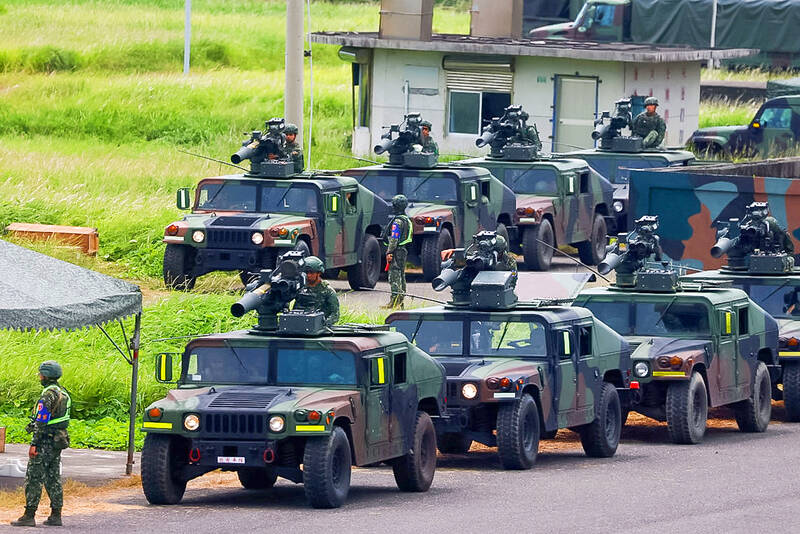Fifty-one percent of Taiwanese support increasing the defense budget, a survey released last week by the Institute for National Defense and Security Research showed, the first time such a policy was endorsed by more than 50 percent of the people polled.
Fifty-nine percent of the respondents in the telephone survey released on Tuesday last week said they agreed that Taiwan should continue to acquire military equipment and weapons from the US to bolster the nation’s defense capabilities, while 51 percent said the defense budget should increase, up 4 percent compared with a study in January.
Among those who favored increasing the defense budget, 44 percent said it should increase substantially, up from 38 percent in January.

Photo: Ann Wang, Reuters
Meanwhile, 49 percent said they supported increasing the defense budget through a special budget plan, while 42 percent said that taxes should be increased to fund new defense spending. Thirty-one percent said that an increased defense budget should come from spending reductions in other areas.
However, the survey found that only 14 percent of respondents said they were very confident in the military, down from 20 percent in September last year, while 30 percent said they were less confident, down from 25 percent.
Fourteen percent of the respondents said that the US would definitely intervene militarily in a cross-strait conflict, down 19 percent from March last year, while 47 percent said US intervention is unlikely or would definitely not happen.
Thirty-three percent of respondents cited China as the biggest national security threat facing Taiwan in the next five years, while 36 percent of people aged 18 to 29 said China is the nation’s biggest threat, the survey showed.
Sixty-five percent of respondents said it is not very likely that the Chinese People’s Liberation Army would invade Taiwan in five years.
The survey — which focuses on changes in public perceptions on national defense and diplomatic issues, as well as challenges after US President Donald Trump returned to the White House — showed that 36 percent said that Taiwan-US relations would worsen in Trump’s second term, up 12 percent compared with January.
Although the US government has sent Taiwan-friendly signals, some Taiwanese have reservations on the development of Taiwan-US relations as well as the state of US security assurances to Taiwan due to the uncertainty of Trump’s policies, the institute said.
The significant rise in support for a substantial increase in defense spending showed there is a strong consensus that the nation’s defense capabilities should be enhanced, and the public believes national defense should be bolstered without compromising spending on other public projects, it said.
Espionage cases in the past few years involving active military personnel might have deepened people’s mistrust in the military as well, the institute said.
Despite China stepping up military threats and its “united front” tactics against Taiwan, the issues did not seem to shake the national security awareness of younger respondents, it said.
“It also showed that people are inclined to be level-headed and rational when considering the possibility of a Chinese invasion in the short term,” it said.
The survey, administered by National Chengchi University’s Election Study Center from March 4 to March 9, gathered 920 valid samples from landlines and 365 from mobile phones, with a margin of error of 2.73 percentage points.

Chinese spouse and influencer Guan Guan’s (關關) residency permit has been revoked for repeatedly posting pro-China videos that threaten national security, the National Immigration Agency confirmed today. Guan Guan has said many controversial statements in her videos posted to Douyin (抖音), including “the red flag will soon be painted all over Taiwan” and “Taiwan is an inseparable part of China,” and expressing hope for expedited reunification. The agency last year received multiple reports alleging that Guan Guan had advocated for armed reunification. After verifying the reports, the agency last month issued a notice requiring her to appear and explain her actions. Guan

GIVE AND TAKE: Blood demand continues to rise each year, while fewer young donors are available due to the nation’s falling birthrate, a doctor said Blood donors can redeem points earned from donations to obtain limited edition Formosan black bear travel mugs, the Kaohsiung Blood Center said yesterday, as it announced a goal of stocking 20,000 units of blood prior to the Lunar New Year. The last month of the lunar year is National Blood Donation Month, when local centers seek to stockpile blood for use during the Lunar New Year holiday. The blood demand in southern Taiwan — including Tainan and Kaohsiung, as well as Chiayi, Pingtung, Penghu and Taitung counties — is about 2,000 units per day, the center said. The donation campaign aims to boost

The Kaohsiung Tourism Bureau audited six hotels in an effort to prevent price gouging ahead of Korean band BTS’ concert tour in the city scheduled for Nov. 19, 21 and 22 this year. The bureau on Friday said that the audits — conducted in response to allegations of unfair pricing posted on social media — found no wrongdoing. These establishments included the local branches of Chateau de Chine, Hotel Nikko, My Humble House, and Grand Hai Lai, it said, adding that the Consumer Protection Commission would have penalized price gougers had the accusations been substantiated. The bureau said the Tourism Development Act

The military yesterday said it has located the flight data recorder, or black box, of an F-16V jet that disappeared off eastern Taiwan earlier this month, and it would soon deploy a salvage team to try to retrieve it. Air Force Command Headquarters said that while it had pinned down the location of the black box, it was still searching for the aircraft’s sole pilot, air force Captain Hsin Po-yi (辛柏毅). Without providing details, the air force said it had located the black box days after detecting some intermittent signals and would now engage a team of professionals to retrieve it. The air